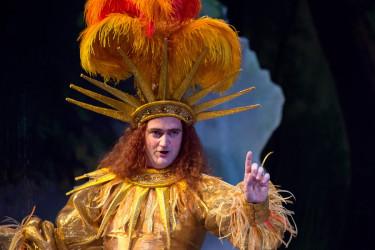
Philharmonia Baroque Orchestra and Chorale present the first modern performance of an opera by Jean-Philippe Rameau and Voltaire: Le Temple de la Gloire (The Temple of Glory). It’s a co-production with Cal Performances and Centre de Musique Baroque de Versailles, and as Music Director Nicholas McGegan explains, in this version, the allegory was a message the king might not have wanted to hear.
There’s more about the performances, from April 28th-30th at the PBO website.
This wasn’t the first collaboration of Voltaire and Rameau, and they didn’t get along very well, but it was ordered after a military victory by King Louis XV. Nicholas McGegan says the government wanted a celebration. “And since France regarded itself quite rightly as the cultural capital of the world, it meant that you had to put on an opera, as the union of all the arts, the biggest thing that you could put on. They were the two most high-profile artists in their field. Voltaire, obviously, as a playwright, as well as a sort of universal bad boy. Always doing things that annoyed the government or the church, or both. And Rameau was the pre-eminent composer.” Voltaire’s willingness to be a thorn in the king’s side comes out in the story of the opera: “You have the Temple of Glory, it’s very sort of Magic Flute in a way. Who’s going to be let in? Is it going to be Envy? Certainly not. Is it going to be Bélus, who’s the subject of the first act, who is belligerent? Quite literally, he’s a thug. Is it going to be Bacchus, who is the god of wine and all that, but is much too much of a degenerate to be allowed in?” If the King was expecting applause for his victory, it wasn’t as much as he would have liked. “The king, I think, got the message, that maybe he should go easy on the girlfriends and the parties, and try governing the country for once.”







